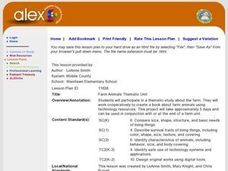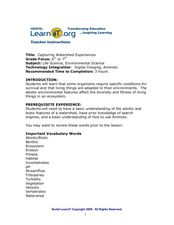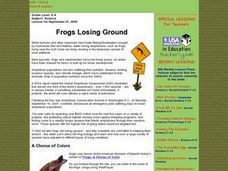Curated OER
Parasite Development and Life Cycle
If you are new to teaching agriculture classes, this outline may be helpful when you are preparing a lecture on parasites in livestock. In addition to lecturing on this topic, the lesson plan suggests that learners research the life...
Curated OER
Let's Go On A Bear Hunt
Students work together to complete a research project on bears. Using the Internet, they answer questions they have about bears and reinforce what they already know. They compare and contrast different species of bears and bears in...
Curated OER
Spring Collecting and Identifying Bumble Bees
Students collect bumble bees in the field, record data, identify and release specimens, answer conclusion questions, and send data in to researcher leaders. They make research based conclusions based upon the evidence.
K12 Reader
Endangered Species
Your learners have likely heard about animals going extinct. By reading this passage, they can find out some reasons why this happens and how to protect endangered species. After reading, individuals respond to five related questions.
Curated OER
Biological Diversity and Conservation
In this conservation biology worksheet, students will complete 9 short answer questions on the different strategies of conservation biology, including the Endangered Species Act and establishing protected areas for animals.
Curated OER
Pio, Pio, Que Frio
Students investigate the characteristics of living things. They determine that different organisms have different needs and describe and compare them. They draw and verbally respond about their favorite animal.
Curated OER
The Forest-Life in the Wild!
Students write a description of each animal using their completed outline and include a graphic of the animal for the program, or a hand drawing. Each student chooses and writes about 2 Rain Forest Animals.
Curated OER
The Importance of Trees in the Rural Area: Planting a Snowfence
Students discuss the importance of trees and work together to plant a living snowfence. In this tree importance lesson, students discuss why trees are important in rural areas. They use mathematics and team work to plant a living snowfence.
Curated OER
Enemies and Threats to Sea Horses
Students research threats and enemies of the sea horse. In this animal biology lesson, students use the Internet to find threats and enemies of sea horses and write a paragraph on their findings.
Curated OER
Build a Hawaiian Bird
Fifth graders make a model of a bird. For this animal adaptations lesson, 5th graders examine how birds adapt to their environment, using Hawaiian birds as an example. Students create their own bird using adaptation paper cut outs then...
Curated OER
Save the Animals!
Learners research an endangered animal and share what they learned through the use of technology. In this interdisciplinary lesson plan on animals, students conduct research on an endangered animal. Then, learners create a PowerPoint...
Curated OER
Web of Life - Role-Playing
Students role-play how organisms adapt to their environment. They play 20 questions with plant and animal habitats. They create a web of life to demonstrate how each plant and animal relies on the other for survival.
Curated OER
A Wild Family Album!
Young scholars create a scrapbook style family album for a selected animal. They complete an interactive Internet activity on research reports, fill out a graphic organizer, diagram a food web, and complete their scrapbook that includes...
Curated OER
Measuring Animal Sizes (and Relative Sizes in our Animal Environment)
Students discover the actual size and weight of many insects and animals. For this biology lesson, students investigate animals and insects to determine their actual weight and size. In groups, students create an animal or insect of...
Curated OER
Farm Animals Thematic Unit
Student study farm animals by watching a teacher made PowerPoint presentation and visiting a farm. They research a farm animal with teacher assistance. They design a book about the animals using available technology and orally present...
Curated OER
Hide In Plain Sight
Students view video clips and use the Internet to look for hidden animals. They then use the Internet to print out animal shapes and color them. They create environments on construction paper in which their animals can hide.
Curated OER
Alien Invaders: An Invasive Species Game
Students are introduced to invasive species and how they affect the ecosystems they now occur in. They explore the basic life histories of several invasive species that are of regional and or national importance. Pupils investigate how...
Curated OER
Insects
Third graders research an insect and creates a brochure on that selected insect. Each student develops a Venn Diagram comparing similarities and differences between moths and butterflies.
Curated OER
Mollusk Matching
Students look carefully at shells and observe the differences between
species and the names of common shells. Then they identify and complete a Mollusk Matching handout included in the lesson and write the letter of each shell in the...
Curated OER
Seeds of Wetland Life
Students participate in several activities on seed exploration. In this biology lesson, students classify seeds according to their dispersal method. They explain the different adaptations plant have to disperse their seeds.
Curated OER
Capturing Watershed Experiences
Students observe organisms found in the water. In this lesson on organisms, students collect water from local streams and tributaries in order to study the organisms found in the water. As a culminating activity, students create a...
Curated OER
What's Wild
Third graders discover the differences between wild and domestic animals. In this animal lesson, 3rd graders chart the differences in the animals and look through magazines for pictures of wild and domestic animals to glue to a poster....
Curated OER
Cardboard Tree and Endangered Animals Lesson
Students create endangered animal figures and their habitats.
Curated OER
Frogs Losing Ground
Learners explore an exhibit through an interactive program on frogs. They can listen to the different sounds frogs make and the different types of frogs. They search for the types of frogs they find in their local area.

























